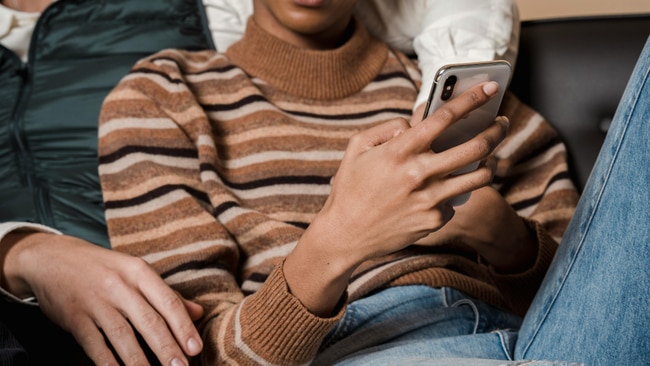‘Sorry, I just saw this': Why I don't want to explain why I'm not replying to your messages
It's ok not to answer messages straight away

Lifestyle
Don't miss out on the headlines from Lifestyle. Followed categories will be added to My News.
Struggling to keep up with messages from family and friends, and punishing yourself for it? It might be time to unsubscribe from urgency culture once and for all.
At this moment in time, I think I have about 143 unread messages. My Instagram inbox is filled with bolded replies that I’ve popped on my to-do list with the understanding that they’ll fade into oblivion (or more likely, the bottom of my inbox).
Similarly, a quick scroll through my Facebook Messenger tells a similar story. A strategically unopened notification indicates that my friend who’s just had a baby has sent me a video of her new bub dancing to the Hamilton soundtrack – essential correspondence that I’ll respond to when I have the energy to dedicate to her.

Message previews show countless mates checking up on me after I was recently made redundant – kind messages that I’ve filed in the ‘too hard’ basket until I’m mentally up for chatting it through. 53 unread texts that I’ll wade through during a personal admin day (which sadly, never comes).
While my unread messages may come with excuses and explanations, the shortest explanation for my predicament is also the most simple. I am bad at replying to messages.
Every friendship group needs someone who’s horrible at replying to messages, and if you’re not sure who it is, it might be you.
We’re seen as the unreliable ones who will either yap their heads off all night on Messenger during a spurt of energy, only to need to be contacted via carrier pigeon because there might be days – nay, weeks – where messages to us just go undelivered and unresponded to.

To me, my unread messages are a symptom of a larger problem. My brain automatically files them under a neverending to-do list, a ‘job’ to get to when I’m mentally energised enough.
But take my undiagnosed and unmedicated raging ADHD where object permanence is simply non-existent, combine it with lengthy periods of depression and anxiety, and sprinkle in some good old fashioned introversion, and you’ve got a recipe for an unresponsive, unreliable and uncontactable friend who you’ll need to message six times in order to actually get an answer from.
It’s brat behaviour, I know. After all, who feels overwhelmed and shitty at the prospect of their friends caring enough about them to reach out and message them?
While I know this is one of my fatal flaws, it turns out that not replying to messages or struggling with internet correspondence isn’t just completely normal – it’s increasing with the advent of technology.

Psychologist Carly Dober says that I’m not an outlier and that there are many reasons why someone might struggle with responding to messages, not limited to mental health issues, struggling with day-to-day lives, being neurodivergent, and just being busy.
But there’s one part of this equation that I find more fascinating – and it’s encouraged me to stop apologising for my delayed response to texts: urgency culture.
“Some people struggle to respond to messages because they are trying to consciously step out of urgency culture, and this should be celebrated and respected,” Dober tells Body + Soul.
Urgency culture is that need of immediate responsiveness and constant availability, exacerbated by our pervasive use of technology. Thanks to the power of social media and the fact that our phones are now an extension of our bodies, we’ve never been more reachable – and while it sounds counterintuitive, this might make messaging harder for some people.
“People might simply feel overwhelmed with the amount of digital touch points they have and digital reach outs that they feel like they have to respond to or think about,” Dober explains, adding that the amount of micro-decisions we make each day as a result of this is very different from ten years ago.
“We don’t have consensus about what is or is not expected of us with smartphones and messages, and this can make boundaries very different and unclear from person to person. Some people live with their phones in their hands, some people turn their phones off a few hours of the day.”

Accessibility is now so pervasive in our lives thanks to social media that it’s hard to remember that just ten years ago, we weren’t contactable 24/7. We’re not only dealing with a huge change in how we communicate, we’re also responding to increasingly challenging social dynamics in response to our availability, or lack thereof.
“People internalise and personalise if a text message isn’t responded to immediately,” Dober says of the shift. “Some people struggle to respond to messages because they are trying to consciously step out of urgency culture, and this should be celebrated and respected.”
But despite psychologists almost giving me permission to suck at messaging, it’s still difficult for me not to constantly chastise myself for my radio silence and inability to do even what seems to be the simplest of tasks.
It’s hard to shake that overarching feeling that you’re ‘bad’ at replying to messages and by extension, also a ‘bad’ friend. But this struggle might offer an opportunity to examine just how and why we feel that way, and begin the steps into slowly uncoupling ourselves from urgency culture.
“We need to evaluate and reconsider our own position with messaging and social availability and we also need to communicate this with the people around us,” Dober says. “I encourage everyone to consider what is actually urgent, versus what feels urgent in the moment but can wait a couple of days or longer.
“Urgency culture blurs the line between what is truly important and what is not.”

While much of these changes need to come from larger societal shifts, there are some concrete ways that we might begin our journey away from urgency culture.
It might be blocking out a specific time each week to wade through your messages and give them the social energy they require. It might look like leaving your phone at home when you go out to get a coffee, doing mindfulness meditations, or engaging in healthy distractions from your phone, like hanging out with animals or listening to music.
It’s here that Dober encourages you to get deep and notice what exactly you’re feeling when you don’t respond to messages immediately.
But it might also be through using the art of communication to let your loved ones know what’s up.
“Draft a simple text message to your close friends and family members who you speak to often and let them know you’re trying to change some of your tech habits for the better and if they don’t hear from you as [quickly], it’s not because they’re not important to you – it’s because you’re trying to change your relationship with your phone,” Dober says.

Above all, there is a key learning we can take away – whether we’re the ones who struggle with messaging or the friend on the other end to an absent mate.
“Understanding that we all have different communication styles and preferences is really important,” Dober advises.
“Not personalising why or why someone might not be responding to my messages when we would like them to is key because we might not have any idea about what they are going through.
“They also just might not want to respond to it when you want them to – and that is also something that people need to get comfortable with.”
More Coverage
Originally published as ‘Sorry, I just saw this': Why I don't want to explain why I'm not replying to your messages




